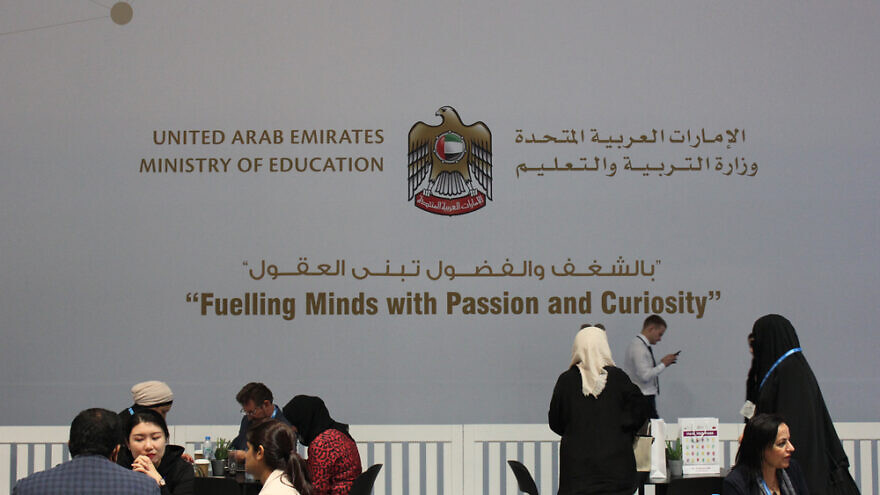The Institute for Monitoring Peace and Tolerance in School Education (IMPACT-se) has uncovered thousands of pages of new teaching material produced by the Palestinian Authority that directly calls for violence and promotes anti-Semitism, even after promising European Union donors it would implement changes.
IMPACT-se found that rather than publishing revised textbooks as promised, the P.A. reprinted last years’ criticized textbooks for use in the current school year. In parallel, it produced thousands of pages of new material, roughly equivalent in size to all the textbooks in the curriculum. The new material contains content that has been determined as worse than current or previous Palestinian textbooks, with a greater number of lessons that directly incite violence and propagate overt antisemitism.
IMPACT-se CEO Marcus Sheff said the P.A. “seems to have gone to a great deal of effort to hoodwink its donors. Faced with a clear call by the E.U. for them to create new textbooks free of hate and anti-Semitism, the P.A. simply reprinted the old ones, then produced thousands of pages of new teaching material with content worse than the textbooks themselves.”
IMPACT-se presented its findings to representatives from the EU Commission, as well as to parliament members in Brussels, who had no knowledge that the old textbooks were still being used in Palestinian and UNRWA schools, or that a set of new, hate-filled materials had been produced in 2021.
IMPACT-se also released a report on Jan. 20 examining 220 Arab-language textbooks in grades one through 12 from the UAE’s national curriculum, printed between 2016 and 2021.
Still some room for improvement
Niclas Herbst, a German politician of the Christian Democratic Union and a Member of the European Parliament who is familiar with the issue, told JNS, the improvements in the UAE curriculum “are a step in the right direction” as they “promote tolerance and trustful interfaith relations.”
Notably, much of the anti-Israel material has been moderated. Passages that previously demonized Israel, presented anti-Semitic conspiracies and blamed “the Zionist enemy” for seeking to exterminate the Palestinian people have been removed. Passages focusing on tolerance towards Jews are widespread throughout the textbooks. Especially noteworthy is the removal of a passage that presented the Palestinian issue as “the basis of conflicts in the Middle East.”
IMPACT-se CEO Marcus Sheff told JNS, “Emirati textbooks are reflective of the assessment made by Crown Prince Mohamed bin Zayed over a decade ago that the West is a potential ally and not a colonial threat; that radicalism is categorically wrong and self-defeating, and that Emirati prosperity in a competitive global marketplace will be built on a tolerant and peace-loving workforce.”
This report examined 220 textbooks, as well as older editions of the textbooks, to conduct a comparative analysis and establish trend lines.
Some outstanding issues still remain in the textbooks, and there is certainly more room for improvement.
For instance, IMPACT-se notes that the State of Israel is still not displayed in most maps. They do, however, show the Green Line, portraying Palestinian territory as confined only to the West Bank and Gaza. This delineation is a step beyond maps taught in textbooks in almost all other Arab and Muslim countries in the region.
While students still do not learn about the Holocaust or the long history of Jews in the region—two important subjects that should be covered extensively in the next version of textbooks—the curriculum does take the view of a changing Middle East.
Now, for instance, the curriculum avoids blaming foreigners for domestic issues and promotes taking local responsibility.
Eighth-grade students are taught that “Islam is a peaceful religion that rejects all manifestations of violence and terrorism.” The curriculum also teaches students to value the principle of respect for other cultures, and encourages curiosity and dialogue.
According to Sheff, “respect for the other, curiosity towards other cultures and experiencing happiness are taught as fundamental values for leading a rich, fulfilling and healthy life. In this changing Middle East, the Crown Prince is a trailblazer in identifying what success for his kingdom should look like. One wonders who will follow.”
The P.A., with pressure from the European Union and the United States, which claim to review Palestinian textbooks thoroughly, could bring similar hope to the region and implement changes that would directly benefit the next generation.
“The majority of the E.U.’s donation to the P.A. goes to its education sector, so one has to ask what the E.U. delegation to Ramallah actually knows about what goes on in P.A. schools,” said Sheff. “At a time when the P.A. is facing a major budget crisis, they’re doubling down on teaching the hate that donor nations said they could no longer tolerate.”
Herbst added that the improvements in the UAE curriculum “are a positive example for all school textbooks, especially for the Palestinian Authority.”


























